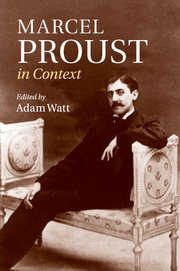Book contents
- Frontmatter
- Contents
- List of Illustrations
- Notes on contributors
- Figure I. Marcel Proust, portrait in oils by Jacques-Émile Blanche, 1892
- Preface
- Figure 2. Proust photographed on his death-bed by Man Ray, 1922
- Note on the text
- Chronology
- Part I Life and works
- Part II Historical and cultural contexts
- i. The arts
- ii. Self and society
- Chapter 14 Freud and psychoanalysis
- Chapter 15 Sexuality
- Chapter 16 Health and medicine
- Chapter 17 Technology and science
- Chapter 18 Religion
- Chapter 19 Travel
- Chapter 20 Journalism
- Chapter 21 Politics and class
- Chapter 22 The Dreyfus Affair
- Chapter 23 The First World War
- Part III Critical reception
- Further reading
- Index
- References
Chapter 21 - Politics and class
from ii. - Self and society
Published online by Cambridge University Press: 05 November 2013
- Frontmatter
- Contents
- List of Illustrations
- Notes on contributors
- Figure I. Marcel Proust, portrait in oils by Jacques-Émile Blanche, 1892
- Preface
- Figure 2. Proust photographed on his death-bed by Man Ray, 1922
- Note on the text
- Chronology
- Part I Life and works
- Part II Historical and cultural contexts
- i. The arts
- ii. Self and society
- Chapter 14 Freud and psychoanalysis
- Chapter 15 Sexuality
- Chapter 16 Health and medicine
- Chapter 17 Technology and science
- Chapter 18 Religion
- Chapter 19 Travel
- Chapter 20 Journalism
- Chapter 21 Politics and class
- Chapter 22 The Dreyfus Affair
- Chapter 23 The First World War
- Part III Critical reception
- Further reading
- Index
- References
Summary
Proust's public involvement in political campaigning preceded the years he spent working on À la recherche. His eager defence of Dreyfus is conveyed in Jean Santeuil where he delivers a forthrightly moral condemnation of judicial and military power, which is depicted as acting squarely in defence of la raison d'État. The other major issue on which he campaigned was Church–State relations. As an outspoken critic of the Combes government's policy of laicity, he opposed the separation of Church and State which was brought about in 1905. His ‘La mort des cathédrales’ [‘Death of the Cathedrals’] (Le Figaro, 16 August 1904) provides a cultural defence of France's religious heritage, seen in his lofty yet implicitly political view as the legacy of a medieval, Christian faithful who form ‘a great silent democracy’ (CSB, 149). Writing to Georges de Lauris on 29 July 1903 (in a letter which Proust refers to as stupid and embarrassing, and one to be destroyed by its addressee), he provides a revealing snapshot of his political thinking at this time. Reflecting both on ‘the dangerous mindset that gave rise to the [Dreyfus] Affair etc’ prevalent in the late 1890s and on the growth in anticlericalism, Proust argues that in both cases, ‘on travaille à faire deux France’ (Corr, iii, 382) [‘the thrust of political life is to divide the country in two’]. Concerned by ‘the fermenting of hatred among the French’ (Corr, iii, 383), Proust notes how the press reinforces prejudice in the laicity debate and stifles independent thinking. He was to restate this view in Le Temps retrouvé where Charlus points to newspaper readers' deluded belief in their autonomous actions: ‘“ce public qui ne juge ainsi des hommes et des choses de la guerre que par les journaux est persuadé qu'il juge par lui-même”. En cela M. de Charlus avait raison’ (iv, 367) [‘“this public which judges the men and events of the war solely from the newspapers, is persuaded that it forms its own opinions”. In this M. de Charlus was right’ (6: 122)]. Suspicious of virulent forms of nationalism during the First World War, Proust shows press influence to be a key agent of ideological formation.
- Type
- Chapter
- Information
- Marcel Proust in Context , pp. 160 - 166Publisher: Cambridge University PressPrint publication year: 2013



